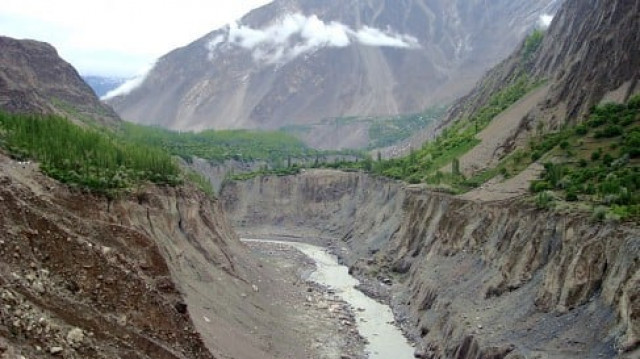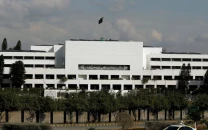Climate Crisis and CPEC: Addressing the environmental fallout for Gilgit-Baltistan
.

Climate change poses a great threat to the mountainous region of Gilgit-Baltistan. Due to its fragile ecosystem, the region is facing serious environmental issues such as natural disasters, glacial lake outburst floods (GLOFs), extreme weather conditions, declining food production, biodiversity loss, land degradation, pollution and water shortages.
Gilgit-Baltistan is home to more than 6,500 glaciers, which cover an area of 13,214 sq km. Snow melting at higher altitudes because of global warming is contributing to glacier recession and frequent GLOF events. These glaciers contribute to 70% water of the Indus River, which is crucial for irrigation and supporting Pakistan’s agriculture. Increased glacial melting rates can possibly hamper food production in the country too.
China-Pakistan Economic Corridor (CPEC) aims at bridging Pakistan and China with global markets through infrastructure and development, which would consequently result in a higher carbon footprint in Gilgit-Baltistan as well. Incorporating and initiating disaster mitigation and sustainable development projects within CPEC for Gilgit-Baltistan would significantly reduce the environmental threats the region faces.
The unpredictability of GLOFs and flash floods make the conditions vulnerable in the region. According to the United Nations Development Program, a total of 3,044 glacial lakes — formed due to the rapid melting of glaciers — were found in Gilgit-Baltistan and Khyber-Pakhtunkhwa in 2022. Floods in Gilgit-Baltistan usually cause road blockages and destruction of infrastructure, including homes, hampering the free flow of goods and people.
In the year 2022, different districts in Gilgit-Baltistan experienced devastating floods. For example, only in Ghizer, more than 200 houses were completely or partially damaged by floods, and human causalities were around 20. According to Gilgit-Baltistan disaster management authority’s officer Khawja Jawad, some 50,000 people were forced to migrate from their homes due to the floods, resulting in an estimated loss of Rs10 billion.
Additionally, drinking water supply systems and irrigation channels also get destroyed, creating serious food security challenges. It is in the best interest of people that concerned authorities think about the environmental degradation in Gilgit-Baltistan. The inclusion of environment-friendly projects under CPEC can benefit the region. For instance, projects related to the construction and repair of small-scale infrastructure can possibly reduce risks of floods.
Moreover, tree plantation, controlled drainage, and mini dams can also minimise the risk of loss and can reduce water shortages. Furthermore, monitoring stations to collect meteorological data can also help report and update the public regarding any impending environmental disasters.
Farming remained a source of livelihood in the region for decades but climate change-induced seasonal shifts in Gilgit-Baltistan reduced crop yields. According to the Skardu Deputy Commissioner, the city boasts approximately 45,000 kanals of agricultural land.
However, this year’s crop yield is less than half of what it was the previous year, and fruit trees have experienced a similarly disappointing decline. Thus, there is a dire need to introduce sustainable projects like IFAD under CPEC to support agriculture in the area.
Additionally, by encouraging organic farming techniques, and water conservation the conditions can improve. Improved road conditions attract more tourists and business to the region- leading to a burden on the natural resources.
According to the government of Gilgit-Baltistan, in 2022, more than 2 million tourists visited Gilgit-Baltistan and this number is increasing with every passing year. Research indicates that more than 7,000 vehicles including trucks and containers will pass through the region on daily basis after the completion of the CPEC project.
The local tourism industry is dependent on fossil fuels like petrol and diesel to generate electricity, adding more carbon to the pristine atmosphere. Additionally, large hotels utilise thousands of litres of fresh water each day to maintain their operations.
Furthermore, the Sost Dry Port in Gilgit-Baltistan remains open only during summers and the constant blockage of the Karakoram Highway due to floods and land sliding hinders trade as well. With increasing environmental degradation, it will be challenging to maintain uninterrupted trade even after the completion of CPEC.
Thus, the region can be preserved only by introducing sustainable tourism, supported by the introduction of clean energy production projects, comfortable public transport facilities, and electric-powered engines for carrying goods.
Moreover, replacing construction materials like steel and cement with stone, wood and clay- an indigenous way of construction can be less harmful. Furthermore, traditional cooking and heating systems also play a critical role in increasing deforestation and pollution in Gilgit Baltistan. Due to the unavailability of Sui gas, and the high cost of LPG, people prefer wood.
In a similar vein, the timber mafia is also active in cutting and transporting timber to different regions. It is need of the time to introduce reforestation projects in the region and take strict action against the timber mafia. Additionally, under CPEC, LPG/Sui gas transportation projects need to be introduced so that the domestic needs of people can be fulfilled, which will result in saving trees.
Under CPEC, China can help in disaster mitigation by providing advanced technology and training to the Gilgit-Baltistan government. Additionally, to enhance the capacity of local government and provincial disaster management authority resilience projects like energy-efficient technologies, waste management programs, water-efficient irrigation and climate education programs can be initiated.
Pakistani federal government can empower the local political leadership by granting more authority to the legislative assembly. The eco-friendly projects will help in reducing the drastic impacts of climate change and will also support the smooth sailing for CPEC in Gilgit-Baltistan. By witnessing a positive change through the green projects, other neighbouring regions and provinces would probably invest in and strengthen the initiative.
Without taking into account the environmental costs in Gilgit-Baltistan, any kind of development will result in loss of habitat, an increase in glacier melting, water scarcity, food shortage and GLOFs. More importantly, it would be a huge challenge for the success of CPEC, if the climate induced disasters disrupt the life in Gilgit-Baltistan. It is in the best interests of China and Pakistan to review and introduce sustainable projects in Gilgit-Baltistan.
The author is an analyst on Gilgit-Baltistan affairs.

















COMMENTS
Comments are moderated and generally will be posted if they are on-topic and not abusive.
For more information, please see our Comments FAQ